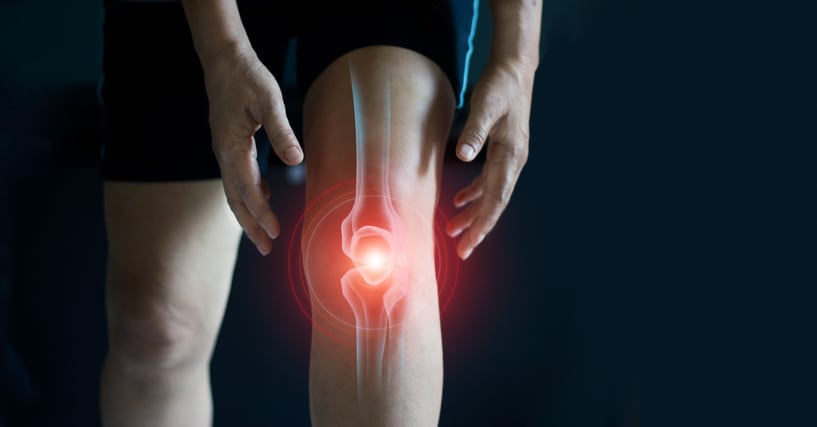The randomized, double-blind, placebo-controlled study included 80 adults aged 40 to 75, who had mild osteoarthritis.
Participants took either collagen peptides or identical placebo tablets every day for 180 days.
The main goal was to measure changes in pain using the Western Ontario and McMaster Universities Osteoarthritis Index (WOMAC) — a standard tool for assessing osteoarthritis symptoms.
The researchers also looked at physical function, overall symptom scores, pain using a visual analogue scale (VAS), joint space on X-rays, and blood markers of inflammation.
Those in the collagen group took three 500 mg tablets twice daily, totalling 3,000mg per day.
The tablets were made from fish skin collagen (Pangasius hypophthalmus) that was broken down into small peptides. These included a tripeptide called Gly-Pro-Hyp, which is easily absorbed and supports cartilage health.
To keep results accurate, people with advanced joint damage or inflammatory arthritis, or who had recently used other joint treatments, were excluded.
Less pain and better function
After six months, participants who took collagen peptides had significantly less knee pain than those who took the placebo.
On average, WOMAC pain scores dropped by 1.9 points in the collagen group but increased by 0.6 points in the placebo group.
Physical function and total WOMAC scores also improved more in the collagen group, beginning around the three-month mark and continuing through the end of the study.
Although both groups reported some improvement in general pain levels — which often happens in longer studies due to regular attention and care — only the collagen group showed meaningful improvements according to the WOMAC results.
Researchers noted that the size of this improvement met the accepted standard for a clinically important difference, meaning the change was noticeable and meaningful to the participants.
No detectable structural or inflammatory changes
Joint X-rays showed no major changes in joint space width in either group after six months. This result was expected, since cartilage and bone structure usually change slowly over a period of years, not months.
Blood tests for inflammation, including C-reactive protein and erythrocyte sedimentation rate, also stayed stable and within normal ranges.
This suggested that the supplement improved symptoms rather than directly reducing inflammation or rebuilding cartilage during the study period.
Safety and tolerability
The collagen peptides were found to be safe and well tolerated, and no serious side effects occurred during the trial. One participant developed mild hives, which went away on their own and were not linked to the supplement.
At the same time, laboratory tests and vital signs stayed normal in both groups, and adherence was high. The researchers noted that taking tablets twice a day was practical and easy for participants to follow in real-world settings.
How collagen peptides work
Collagen is a key protein that gives strength and flexibility to cartilage, ligaments and bones. When collagen is broken down into small peptides, these fragments are easier for the body to absorb.
Although the supplement in this study came from type I collagen derived from fish skin, earlier lab research had shown that this type of collagen could stimulate the production of type II collagen, which is the main collagen found in joint cartilage.
This could help explain how collagen peptides support joint comfort and movement. However, the study did not directly measure collagen production in the body, so this remains a proposed mechanism rather than proven fact.
Collagen peptide’s place in osteoarthritis care
Treatment for knee osteoarthritis usually involves a combination of approaches, such as exercise, physical therapy, weight management, and short-term pain relief with non-steroidal anti-inflammatory drugs (NSAIDs) or topical products.
However, many people prefer natural, long-term options that have fewer side effects. Nutritional supplements like collagen peptides are already popular but most past studies involving them have been small or short-term.
This six-month study adds stronger support for LMCP as a safe and effective way to ease symptoms in people with early osteoarthritis.
It also fits real-world use, where people take daily supplements and expect gradual improvements over time rather than quick fixes. The findings suggested that LMCP could be especially useful for those who want to reduce or avoid long-term NSAID use.
Study limitations
While the results are encouraging, the study had some limitations. Only 60 participants were included in the final analysis, which was a relatively small sample.
Since people with obesity, advanced osteoarthritis, or those already using other joint treatments were excluded, the results may not apply to all populations.
The study also used X-rays, which are not sensitive enough to detect small changes in cartilage. More advanced imaging methods, such as MRI, would provide clearer insights.
In addition, the study lasted only six months, which was too short to determine whether collagen peptides could protect joints over the long term.
Because the study did not show cartilage rebuilding or inflammation reduction, collagen peptide products should not claim to treat or reverse disease.
Instead, it would be more accurate to say they support joint comfort and mobility when taken daily and consistently over time.
The takeaway
This six-month clinical trial found that 3,000mg per day of low-molecular-weight collagen peptides improved knee pain and physical function in adults with mild osteoarthritis, without any safety concerns.
Although no structural or inflammatory changes were seen — something expected in early disease over a short time period — the supplement clearly helped reduce discomfort and made movement easier for participants.
For consumers, this means collagen peptides can be a safe and practical way to support joint comfort, especially for people with mild osteoarthritis who are looking for gradual, natural relief.
For researchers and manufacturers, these results provide evidence that LMCP is a promising ingredient for symptom management, with potential for even greater benefits to be shown in larger and longer studies.
Daily use of collagen peptides may safely reduce pain and improve movement in people with early knee osteoarthritis. While they don’t rebuild cartilage in the short term, they can help knees feel and function better when taken regularly.
The researchers concluded: “Future studies should incorporate longer follow-up durations, active comparators, and advanced imaging or biochemical markers to clarify the long-term role of LMCP in comprehensive, nutrition-integrated OA management.”
Source: Frontiers in Nutrition. 2025, 12. doi: 10.3389/fnut.2025.1644899. “Efficacy and safety of low-molecular-weight collagen peptides in knee osteoarthritis: a randomized, double-blind, placebo-controlled trial.” Park Sun-Young, et al.




